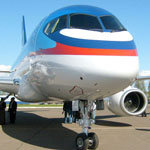Sukhoi superjet-100 crashes in Indonesia

Rescuers discovered the shattered wreckage of a new Russian made passenger plane Thursday that smashed into the side of an Indonesian volcano during a flight to impress potential buyers. All 45 people on board were feared dead. Due to the remoteness of the crash site and the steep rugged terrain, the bodies will be placed in nets and lifted by ropes to a hovering chopper national search and rescue agency spokesman Gagah Prakoso said. Heavy mist was hampering visibility, however, forcing the postponement of evacuations until Friday.
“So far we haven’t found any survivors, but we are still searching,” he said as teams of soldiers, police and volunteers continued to troop up the slopes.
The Sukhoi Superjet-100 — Russia’s first new model of passenger jet since the fall of the Soviet Union two decades ago — was in Indonesia as part of a six-nation tour of Asia aimed at drumming up new customers.
It was carrying dozens of representatives from local airlines and journalists on what was supposed to be a quick, 50-minute demonstration flight Wednesday. Some excited passengers snapped pictures of themselves smiling and waving in front of the twin-engine jet before lifting off, then quickly posting them as profile pictures on Facebook and Twitter.
Just 21 minutes after takeoff from a Jakarta airfield, however, the Russian pilot and co-pilot asked for permission to drop from 10,000 feet to 6,000 feet (3,000 meters to 1,800 meters), said Daryatmo, chief of the national search and rescue agency.
They gave no explanation, disappearing from the radar immediately afterward.
It was not clear why the crew asked to shift course, he said, especially when they were so close to the 7,000-foot (2,200-meter) volcano, or if they got an OK.
Communication tapes will be reviewed as part of the investigation. It’s unlikely they will be released to the public any time soon.
Prakoso said the plane smashed into the jagged ridge on top of Mount Salak, a long-dormant volcano at speeds of 480 miles per hour (800 kilometers per hour).
It exploded and sent debris tumbling down the side of the mountain, leaving a giant earthy gash along the slope as trees in its path were stripped bare.
Family members, many of whom spent a long, sleepless night at the airport, broke down in tears on hearing news that the wreckage had been spotted, first by helicopter, then by land search-and-rescue teams.
Others stared blankly ahead in disbelief.
The Superjet — developed by the civil aircraft division of Sukhoi with the co-operation of Western partners — has been widely considered Russia’s chance to regain a foothold in the international passenger plane market. The country’s aerospace industry was badly undermined in the economic turmoil following the 1991 collapse of the Soviet Union.
The 75-to-95-seater plane has been touted as a challenger to similar-sized aircrafts from Canada’s Bombardier Inc. and Brazil’s Embraer SA.
Potential buyers will scrutinize the crash investigation for signs of flaws in the aircraft.
“If it’s a technical fault … then obviously that will be very serious for them,” said Tom Ballantyne, a Sydney-based aviation expert. “But if it’s pilot error or the fault of air traffic control, it won’t be quite so bad because they’ll be able to say, ‘Well, it’s not the airplane’.”
The Superjet made its inaugural commercial flight last year.
“It is their big hope that they will somehow get into the jet aircraft passenger market in a bigger way than they have,” Ballantyne said.
“We all know that the Russians have had a dreadful record in the past with their aircraft, so this was vitally important to their industry.”
With a relatively low price tag of around $35 million, the plane has garnered around 170 orders. And Indonesia, the world’s fourth most populous nation with a fast-growing middle class, is already one of the biggest customers.
Kartika Airlines, Sky Aviation and Queen Air — among dozens of airlines to have popped up in Indonesia in the last decade to meet the growing demand for cheap air travel — had ordered a total of at least 48.
All but 10 of the 45 people on board the plane Wednesday were potential buyers and journalists, said Sunaryo from PT Trimarga Rekatama, the company that helped organize the event.
The others were Russians, all from Sukhoi companies, an American consultant with a local airline and a Frenchman with aircraft engine-maker Snecma.